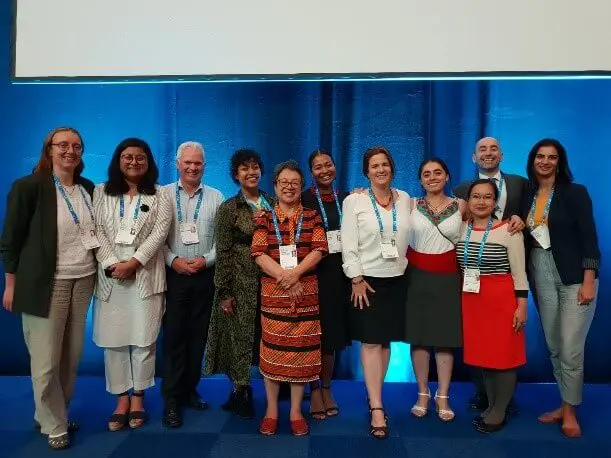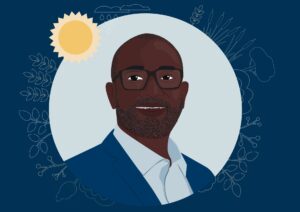- SIWI – Leading expert in water governance
- /
- Latest
- /
- Indigenous voices at WWW 2019: Sharing experiences and efforts led by their networks in water management
Indigenous voices at WWW 2019: Sharing experiences and efforts led by their networks in water management

SIWI and the UNDP-SIWI Water Governance Facility co-convened a session titled ‘Experiences from Indigenous peoples’ networks in water management’ on Monday, 26th August 2019 at the World Water Week in Stockholm. There are a number of indigenous peoples’ networks and organizations working in the direction of achieving this objective. They are contributing by developing new tools and indigenous knowledge systems, producing guidelines and ‘good practices’, raising the concerns and challenges of indigenous communities in different platforms, and initiatives leading to influencing local, national and international policies.
The UNDP Equator Initiative acknowledges and celebrates the efforts of such indigenous networks and organizations at an international platform through its UNDP Equator Prize initiative. One of the winners of the Equator Prize (2012), The Centre of Environmental and Social Studies in Mexico, was represented at the event. It has received other recognition such as Elinor Ostrom 2013 Award, AMER 2013 Award best rural initiative as well. The Centre has been working in the central mountain region of Guerrero on promoting local access to safe water, enhancing community water management practices and providing support in integrated resource management, capacity building of local communities on integrated resources management, among other activities. The indigenous representative presented a case on farmer’s experiences in socio-environmental resilience in Montaña Baja of Guerrero, México where the Center has been working towards integrated resource management. Their focus has been on developing traditional knowledge science, undertaking actions to maintain the protection and sustainable water management, and creating alliances at national and international level. The Centre has been making efforts to raise awareness on these issues along with strengthening local capacities and recognizing the traditional and cultural practices of indigenous people in the region.
Working at global, regional and national scales, the Philippines-based Tebtebba network of the Indigenous Peoples’ International Center for Policy Research and Education works through its various programmes and initiatives towards initiatives to ensure water security for indigenous peoples. It also strives for improving community-based monitoring and information systems (CBMIS), recognition, protection and fulfillment of indigenous people’s rights along with disseminating widely the indigenous knowledge and voices. Tebtebba also hosts the Asian Indigenous Women’s network (AIWN), connecting indigenous women networks across Asia for networking and organizational consolidation. AIWN’s key objectives are lobbying and advocacy, capacity building, mainstreaming gender and indigenous women in indigenous peoples’ works in the region.
The final case presented was from a Kali’na women of Kaikoesie Foundation in Netherlands on land and water rights, and water pollution challenges faced by Ka’lina indigenous communities in the Amazon forest in Suriname. The human rights and land rights for the Ka’lina and Lokono people of Amazon was recognized in a ruling in 2015 by the Inter American Council of Human rights, with the efforts and a petition raised by the Tribal leaders and organizations from the indigenous community to the court. However, challenges persist and the indigenous communities in the state continue to face the challenges over the land and water rights. Alongside they are facing the challenges of water pollution with the mining activities in the territory where cyanide and mercury to abstract the gold releases toxic back into the water.
With a focus on indigenous and water governance and having two inspiring closing keynotes by the UN Special Rapporteurs, the event made a mark at the Week. Emphasizing on the right to water and sanitation for indigenous groups and putting it on the top of the governments´ agenda and SDG’s, Mr. Heller noted that the pattern of discrimination is evident in many countries and efforts are needed to reduce these inequalities. He also stressed on recognizing the spiritual and cultural connection of water and people. The need to respect indigenous rights and their traditional and cultural knowledge around water and resource management, was echoed by the UN Special Rapporteur on the Rights of Indigenous Peoples, Victoria Tauli-Corpuz as well.
Most recent

SIWI’s endorsement of the COP29 Declaration on Water for Climate Action
- Water and climate
- World Water Week
- Water governance

Women hold the key to building climate resilience
- Gender and water
- Resilience through water

Water for Climate in Baku
- Water and climate
- Water and the 2030 Agenda
- World Water Week

SIWI-WASH experts join IVL

SIWI Amman hosts Ghana representatives for WASH exposure visit in Jordan

In loving memory of Kasonde Mulenga


